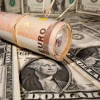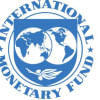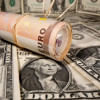Forex reserves keep eroding despite currency swap

Bangladesh's foreign currency reserves are yet to reach a comfortable position despite introducing currency swap deals with commercial banks, growing remittance inflows ahead of Eid, falling imports and a spike in exports.
The reserves stood at $19.45 billion on Wednesday, down by a staggering $533.82 million in the span of a week due to the selling spree of the American greenback by the central bank to commercial banks.
Under the currency swap agreements introduced last month, the banking regulator took $1.17 billion from commercial banks and injected around Tk 20,000 crore in the form of local currencies into the banking system, according to several central bankers.
The inflow of remittance has been increasing since January and it is expected to receive a major boost this month and next month owing to Eid-ul-Fitr as remitters transfer a higher volume of funds to help their families and relatives at home celebrate the occasion with festivity.
Between March 1 and March 22, Bangladesh received $1.41 billion in remittances and this might cross $2 billion at the end of the month.
Imports fell 7.62 percent year-on-year to $5.45 billion in January, the latest for which the central bank data is available. Exports rose 12.04 percent to $5.19 billion in February.
Despite the positive developments, the forex reserves are still not out of the woods and it fell further owing to an elevated demand for the US dollars and the recent Asian Clearing Union (ACU) payments by the central bank.
The Union is a payment arrangement whereby the participating countries -- Bangladesh, Bhutan, India, Iran, the Maldives, Myanmar, Nepal, Pakistan, and Sri Lanka -- settle payments for intra-regional transactions among themselves.
The reserves were $21.15 billion in the first week of March before slipping to $19 billion after the clearance of $1.35 billion in ACU payments, said a number of central bank officials.
The officials say the BB is now trying to keep the reserves within the limit set by the International Monetary Fund (IMF) with its $4.7 billion loan programme. However, it will be difficult to do so since the central bank has to supply US dollars from its reserves to help them settle import bills.
Currently, the net forex reserve stands at less than $18 billion. The country will have to ensure a minimum reserve of $19.27 billion by March and $20.11 billion by June to meet the conditions of the Washington-based lender.
The net international reserves are calculated as reserve assets minus predetermined net short-term foreign currency drains.
The banking watchdog needs to support state-run enterprises to clear import obligations.
State-run banks are particularly securing US dollars from the BB for settling import payments of the Bangladesh Petroleum Corporation, the Bangladesh Agricultural Development Corporation, and the Bangladesh Chemical Industries Corporation, among other government agencies.
In July-December of the current financial year, the BB sold $5.68 billion to banks, BB data showed. The BB has pumped more than $28 billion into the banking sector from its reserves in just two years, a development that caused the reserves to halve.
The chief executive of a private commercial bank told The Daily Star that the currency swap arrangement is not helping the central bank to improve its net reserve situation because it is a liability.
He, however, acknowledges that the deals are boosting the gross reserves.
Banks are buying US dollars at Tk 119 to Tk 122 from remitters but they have to sell them at Tk 110 per dollar to the central bank. As a result, banks are incurring losses.
Emranul Huq, managing director of Dhaka Bank, however, said the currency swap is a win-win situation for both the central bank and commercial banks.
"Some banks have idle US dollars and they now can keep them with the central bank because the interbank exchange rate is not fully active now."
"The arrangement is also allowing banks confronting liquidity shortage to avail local currencies from the central bank in exchange for the international currencies."

 For all latest news, follow The Daily Star's Google News channel.
For all latest news, follow The Daily Star's Google News channel. 








Comments